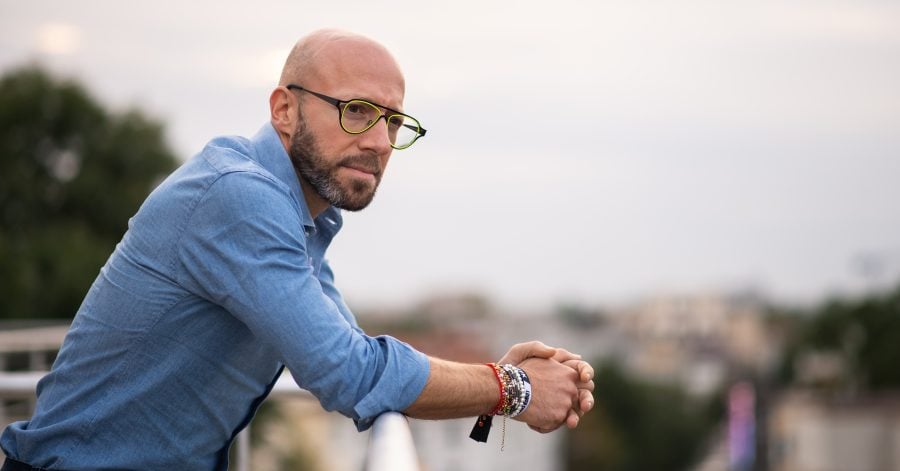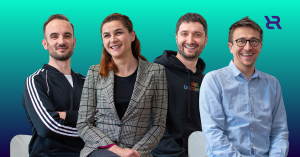In the following interview with The Recursive, Petr Baron, CEO of tbi, shares a comprehensive reflection on the evolving landscape of banking and finance in Southeast Europe. He sheds light on the importance of team happiness and its impact on product development and customer satisfaction, setting the stage for a deeper exploration into how tbi bank is positioning itself against the backdrop of global fintech trends and the shift towards digital banking solutions. This piece aims to offer valuable insights into the strategic thinking and leadership driving tbi bank’s approach – to act more like an innovative fintech, rather than a conservative slow bank.
The Recursive: In this interview, we’re going to talk a lot about the future. But before we get into that, let’s start with a reflection on the past and what happened in 2023. From your perspective, what were the biggest achievements of tbi bank in 2023 that you’re personally most proud of?
Petr Baron: There are quite a few. Of course, there’s also a list of things that we want to improve. We believe that we can always be better. On the list of achievements, firstly, tbi was voted the best employer in Bulgaria out of the banks and number four overall. For me, this is the most important thing because it means that our colleagues are happy with what they do. We’ve created an environment where they believe they can grow, achieve things, and smile when they come to work. That’s the most important thing for any professional. Only a happy team can build great products, which make clients happy. And we proved it. Due to our team efforts, we won the Pan Finance Award for the best banking app in Bulgaria and were voted as the favourite financial institution in Bulgaria. That is very important because it’s building on what we have been trying to do in terms of organization – not the way banks usually are perceived, but really turning towards the customer.
It is believed that you challenged the whole local market with your neon card. What do customers benefit from this daily banking solution?
Petr Baron: Last year in Bulgaria, we launched our neon card along with our mobile wallet, offering free banking services that customers truly need. Your account is free, your card is free, and your payments both in Bulgaria and to any Euro market are free and instant…
We offer customers a mobile wallet equivalent to any neobank, plus a neon card which is unique for the market. It can go both as a debit or credit card. You can split any purchase for up to three months for free.
Our saving products have also been successful in the mobile app. We have three types of saving products – deposits with the best interest rates on the Bulgarian market, interest rate on the current account, and “Kasichka” for smaller customer savings needs.
The proposition we brought to the market is unique and offers flexibility. If customers need daily banking services, they don’t pay anything. If they want good savings rates, they have them directly in the app. If they need to buy something and are short until the end of the month, they can use their pre-approved limit.
In 2024, we’re bringing more features like pay by phone number and offers from our merchants directly in the app. We’re building a mobile ecosystem of services. I’m very proud of both the bank’s team and what we’ve brought to the consumers.
In a way, you’re not really competing with traditional banks but with tech super app companies like Revolut. What is the USP of tbi bank compared to such players?
Petr Baron: We are hyper-local, and this is our huge advantage. Look, Revolut is a very successful business. They’ve done a lot of things well, maybe a bit rushed, leading to issues with regulators and auditors. But we’re not afraid of competition.
We believe local challenger banks like tbi perform very well against global players. Why? Because we are better integrated to the local payment habits and know the local customer needs better. We have financed every fifth Bulgarian, so people know it is more likely to receive financing for their needs from us. We also have strong relations with local merchants in different areas. Last, but not least, we stay closer to customers through our local chat support, our customer experience center, and our colleagues in offices across the country. In addition, for your daily life, you still need to pay local utilities and taxes, and here we also come in.
We’re not perfect, I will never say this. But we’re constantly learning from customers’ feedback. We get a lot of reports, talk to our customers, listen to their complaints and needs, and look at the list of issues coming through chat and other channels. We’re getting better and better.
Can you provide specific examples of how, as a leader, you encourage an innovative and entrepreneurial culture at tbi bank?
We, as a team, truly believe in our values – to be brave, passionate, and caring. These are not just words put on the wall. We really work through these values. I personally make decisions through the prism of these values, and my colleagues see that I’m genuine. They see that this is how they are also expected to operate, and if they do, they’ll be part of something big and exciting.
Thus, we have created an environment that is centered around our culture and values. In other banks, it’s common to find someone at fault and blame that person. We’ve worked hard to remove such limitations and make our colleagues feel comfortable. This includes people who are joining our organization and those already here who saw that they wouldn’t be blamed or have their next project denied for making a mistake. Instead, we sit down with them and review what went wrong, how we could do better, and what we can learn from it. Once people see this consistency, they change and can bring great things to the table. People have a lot of great ideas and want to be part of something more exciting than just a 9 to 5 job.
It all comes down to how people are treated, seeing examples, and allowing them to contribute. It’s not rocket science. Any book you read about culture and creating the right environment starts from here. People need to be led by example, and our senior team is doing just that. We provide what is called psychological safety. People feel comfortable trying new things, learning, failing, and not being punished for it. We’re still a bank, and we need to be careful, but nobody gets fired for making mistakes and learning.
Building on what you said earlier, how do you manage to find the balance between acting fast, innovating, and complying with regulations and all the necessary processes?
Petr Baron: It is a difficult balance. For banks or financial service providers, being heavily regulated is a given. For us, adhering to regulations is crucial, and here we don’t take risks. But, we have two approaches that help us.
Firstly, we are constantly looking at what’s happening around the world. There are many great examples in Europe that we can learn from, especially since most of the regulation is standard across the European Union. We’re always open to learning and educating ourselves. We’re always thinking about how others have solved certain issues, both technology-wise and process-wise. Our team consists of 19 nationalities. We operate in multiple countries and have teams in diverse locations like Romania, Greece, Latvia, Ukraine, Georgia, and Turkiye. This multicultural and international experience helps us in solving problems.
Secondly, we always try to think from the front end, not the back end. We start from the customer and work backward. Unfortunately, or fortunately for us as a challenger bank, most of the banks think from the back end. They think about what needs to be done at the back and then how it will be for the customer at the front. We, however, start with how it should be for the customer. This approach changes the paradigm. When you think from the customer’s perspective, you see challenges differently.
The difference in approach is the key. We have to comply with the same rules and regulations, but we constantly do things in the market that others then follow. It’s not because we’re geniuses, but because we’re seeing many things happening around us, adapting them to our locality, and then they become a trend. We’re always moving that way one step ahead.
Okay, so compliance aside, from your perspective, what are the global fintech trends you believe are here to stay and where will tbi bank be positioned? Like, for example, which part of all the AI hype is true and which do you think could be real added value for banking customers?
Petr Baron: I think AI is going to be extremely useful for banks, and we’re already using a lot of AI in different solutions, whether it’s compliance, development, or customer support. AI is already here, flowing through our infrastructure and being utilized more and more. And banks have a lot to win from AI. Remember, 10 years ago, there was no mobile banking, and everything required paper and face-to-face identification. Imagine how much AI is behind face identification technology now. It’s not just hype, it’s a reality.
In terms of overall trends, embedded banking is a big one. Customers are getting used to having everything on their mobile, instant and contextual. Many things are already instant, like instant payments, but being contextualized hasn’t really happened yet. Embedded banking means financial services become part of the journey on digital platforms, reaching mass audiences.
Ecosystems are another big trend. More ecosystems are appearing, merging financial services with retail or journey experiences. Digital flows save time and provide easier experiences for customers and better sales for businesses. Digitalization isn’t just about having APIs, microservices, or using the cloud; it’s about being part of an ecosystem through embedded banking. Money will flow through these platforms, and that’s what embedded banking is about.
So, what are the next priorities for the team in 2024? If we meet again in one year, what needs to have happened so you’re happy with the results?
Petr Baron: What’s most important for me is to see our customers happy using our services. We’re aiming for fewer calls and chats to our Customer Experience Center about problems, and for the customer experience to become smoother. If we get this right across all services – whether it’s about payment plans, using cards, or sharing money with friends – we want to ensure customers can use our services as frictionlessly as possible. This is what ultimately wins success.
While banks are measured by financial performance, and we have been very successful with yet another record year, customers ultimately vote with their money. The better we perform, the more successful our business will be.
I could talk about all our plans to launch new services in Greece, Bulgaria, Romania… But if we see our net promoter score (NPS) increasing and customers calling us less with issues, because our services are easier to use and understand, we’ll be happy. Our goal is to make things as simple and user-friendly as possible for our customers.








